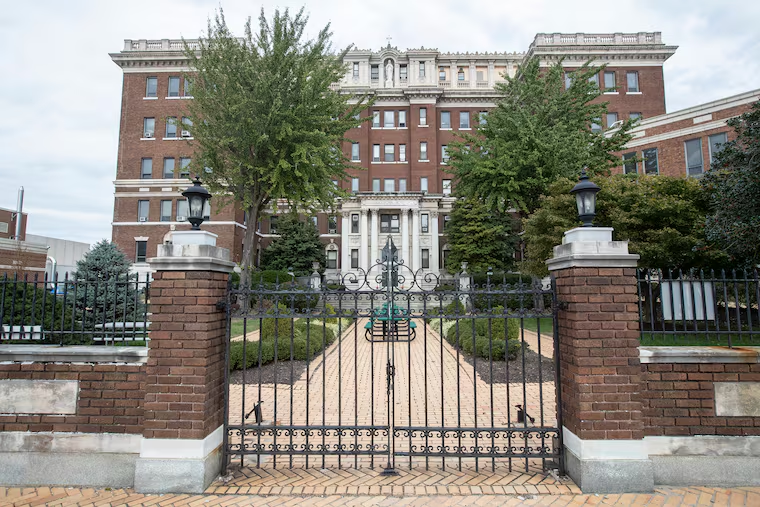Mercy Philadelphia Hospital has new lease on life through Penn Medicine and other nonprofits
Under an arrangement with Penn Medicine, Mercy's emergency department will stay open, with limited inpatient beds.

When the owner of Mercy Philadelphia Hospital announced in February that it would end inpatient care at the West Philadelphia safety-net facility, a group of health-care executives and city leaders was determined to avoid the chaos that accompanied the abrupt closure of Hahnemann University Hospital during the previous summer.
“We talked through how to make this transition the anti-Hahnemann,” Kevin Mahoney, chief executive of the University of Pennsylvania Health System, said of his initial conversation about the fate of Mercy with Councilmember Jamie Gauthier, whose district includes Mercy, at 501 S. 54th St.
What that means for Mercy, which opened in 1918 as Misericordia Hospital, was revealed Thursday.
In a complicated arrangement, the nonprofit Public Health Management Corp. will acquire the 600,000-square-foot property and offer health and social services there in collaboration with the current owner, Trinity Health Mid-Atlantic, and Independence Blue Cross, the region’s largest insurer.
Penn, under a 10-year lease with PHMC, will operate the emergency room, with an estimated 40 to 60 inpatient beds attached to it, and a behavioral health unit with an estimated 40 beds. The site will operate under the Hospital of the University of Pennsylvania license.
PHMC chief executive Richard Cohen declined to say how much it will pay Trinity for the building. Penn will provide $30 million to support the transaction through a prepaid lease, under a resolution approved Thursday by the university’s trustees. The sale is expected to close in March.
“It’s not trying to keep the bricks and mortar of the hospital open,” said Mahoney, who spoke of a future in which an “ambulatory safety net” is more effective than a traditional hospital safety net. “It’s trying to make sure the people on 54th Street don’t have to drive 20 to 30 blocks to get the care they need,” he said during an interview, referring to the 2.3 miles to HUP.
“The measure of success of this project is whether we’re able to put in place the social services and primary care practices that are needed to keep those patients out of the emergency room and out of the hospital,” Mahoney told members of the University of Pennsylvania board’s budget and finance committee.
Stuart Fine, who recently retired as a professor at Temple University’s College of Public Health, commended all the parties involved in the Mercy arrangement. “This is exactly what should occur,” he said. “It benefits the people of West Philadelphia tremendously, ensuring that they will have available to them the truly needed primary and secondary levels of services, and I wish the same sort of thing could have happened with Hahnemann.”
Mercy’s emergency department, which underwent a $15 million renovation and expansion in 2018, had 48,000 visits in the year ended June 30, 2019. The hospital is licensed for 157 beds, but during the COVID-19 pandemic it had an average daily census of 40 to 50 patients, said James Woodward, president and CEO of Trinity Health Mid-Atlantic.
Trinity officials said in February that the hospital lost money for six of the last seven years, and had lost a quarter of its patient volume since 2013. The emergency room, with 36 treatment bays, and its behavioral health services account for 90% of its business now, Woodward said.
Late last year, Mercy announced plans to close the hospital’s crisis center for mental health emergencies, just a month after it closed a similar facility at the Mercy Fitzgerald Campus in Darby. The hospital voluntarily relinquished its license after its center failed a November inspection, and was cited by the state for overusing restraints.
But Trinity Mid-Atlantic, which is part of a large national Catholic chain based in Michigan, plans to continue to provide medical and other services at the West Philadelphia site, and will continue to operate the Mercy Senior Center at 5901 Market St., which will expand to include primary and specialty health-care services, Woodward said.
Mercy employs about 800 now, officials said, down from about 900 when Trinity announced the closure in February. Mahoney and others said they hoped to keep all of those people employed at the revamped Mercy campus, at other Penn facilities in Philadelphia, at PHMC, or at Mercy Fitzgerald in Darby.
Independence will provide $5 million of support to fight hunger, promote health and wellness programs, and support the senior population, according to outgoing chief executive Daniel J. Hilferty, whose health-care career started in 1982 in community relations at what was then Misericordia Hospital.
Hilferty was heavily involved last year when most area health system CEOs tried to find a way to save a segment of the services offered at the much-bigger Hahnemann University Hospital, with an emphasis on the emergency department and mental-health services. Hahnemann, sold by publicly traded Tenet Healthcare Corp. to California investor Joel Freedman for $170 million, was running out of money too quickly to be saved, people involved in those talks have said.
Mercy was far different, Hilferty said: “It wasn’t driven by a publicly traded entity like at Hahnemann. It wasn’t driven by an investor who wanted to leave with some type of income from it. It’s a group of committed organizations, including Independence, that want to improve the quality of care in areas that traditionally have not had access to that level of care. It’s who we need to be as a community.”
Cohen, of PHMC, said it is too early to say exactly what services his organization will bring to the campus itself and through other service providers. PHMC says it serves 350,000 people annually with a wide array of services, including behavioral health services, emergency assistance, health-care centers, and autism services.
“This is really true public health. This is the bringing of a wide array of health and social services, behavioral health, jobs,” Cohen said, “to a community in one place.”